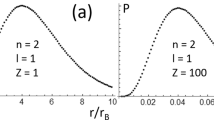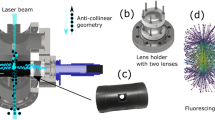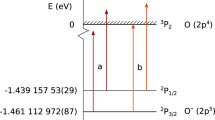Abstract
IN an earlier paper1, we published the results of some calculations of analytical atomic wave functions for the ground-states of atoms lithium to neon. Since that tune, we have had several requests for the values of the associated total electronic energies. These energies are therefore presented in the accompanying table, where they may be compared with those deduced from experiment. For the lighter atoms these experimental values have been obtained by summing the first, second, . . . ionization potentials of the atoms. For nitrogen, oxygen and fluorine, however, it has been necessary to estimate the last ionization potential by means of a small extrapolation. But the ‘experimental’ values quoted should all be accurate to about 1 part in 10,000. In no case do the theoretical values differ from the experimental ones by more than 1 per cent. This would still be true if an allowance were made for the motion of the nucleus.
This is a preview of subscription content, access via your institution
Access options
Subscribe to this journal
Receive 51 print issues and online access
$199.00 per year
only $3.90 per issue
Buy this article
- Purchase on Springer Link
- Instant access to full article PDF
Prices may be subject to local taxes which are calculated during checkout
Similar content being viewed by others
References
Proc. Roy. Soc. Edin., 62 A, 37 (1944).
Phys. Rev., 48, 948 (1935).
Author information
Authors and Affiliations
Rights and permissions
About this article
Cite this article
DUNCANSON, W., COULSON, C. Atomic Binding Energies. Nature 164, 1003–1004 (1949). https://doi.org/10.1038/1641003b0
Issue Date:
DOI: https://doi.org/10.1038/1641003b0
Comments
By submitting a comment you agree to abide by our Terms and Community Guidelines. If you find something abusive or that does not comply with our terms or guidelines please flag it as inappropriate.



